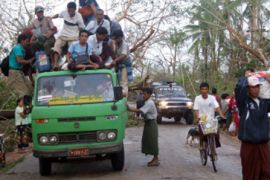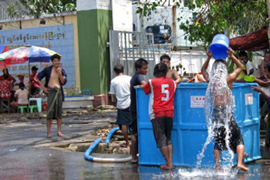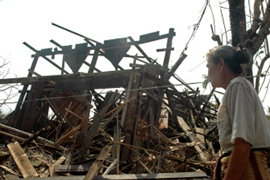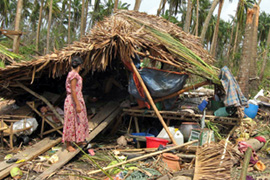UN suspends aid flights to Myanmar
WFP says all food and equipment flown for cyclone victims seized by the government.

 |
| Latest figures suggest that more than a million people are in need of aid [AFP] |
The UN’s main humanitarian agency says that the Myanmar military government has seized all the food and equipment that the WFP had flown into country to assist the victims of Cyclone Nargis.
Paul Risley, a spokesman for the World Food Programme office in Bangkok, Thailand, said on Friday the WFP “has no choice” but to suspend further aid shipments until the matter is resolved.
Keep reading
list of 4 itemsPalestinian Prisoner’s Day: How many are still in Israeli detention?
‘Mama we’re dying’: Only able to hear her kids in Gaza in their final days
Europe pledges to boost aid to Sudan on unwelcome war anniversary
“The food aid and equipment that we managed to get in has been confiscated,” he said.
The shipment included 38 tonnes of high-energy biscuits.
Risley said it is not clear why the material was taken. It is also not clear if the shipment seized was the one that was flown in on Thursday or another one.
Mounting frustration
Underscoring mounting frustration over the military government’s response to the cyclone crisis, Risley called Myanmar‘s refusal to grant visas to foreign aid teams “unprecedented in modern humanitarian relief efforts”.
He said the organisation had submitted applications for visas with Myanmar diplomatic missions around the world, but all had been caught up in paperwork.
| In depth: Myanmar cyclone | |||
|
Witness: ‘Utter devastation’ Millions displaced Generals’ grip threatened Disease stalks cyclone survivors Picture gallery |
Earlier, Mark Canning, Britain’s ambassador to Myanmar, told Al Jazeera that the relief operation for Myanmar is likely to be twice the size needed in Aceh province in Indonesia, after the 2004 tsunami.
“The scale of this catastrophe is becoming clearer all the time. The official death toll is around 23,000. But I’m afraid it’s going to escalate dramatically in the coming days,” he said.
“There are between one and one and a half million people who are thought to be vulnerable. The conditions are horrendous. So you’re talking about an aid operation that is I think about twice the size of the Aceh relief operation. Some aid is getting through. Some UN and other flights, some World Food Programme convoys, are getting through. But they’re not getting through fast enough, not in the volume that is needed.”
Some relief supplies have been allowed to land in Myanmar, but many more tonnes of aid and dozens of expert foreign staff have not, leaving hundreds of thousands of survivors at risk of hunger and disease.
Christina Fink, an author and expert on Myanmar, told Al Jazeera that the government is slowing aid deliveries, justified through a “security perspective”.
She said: “They are under the impression that if they let international aid into the country, the world will see how they are violating the rights of their people, how they have grossly mismanaged funds and finance that should essentially go to the impoverished.”
“This is a case of damage-control on the part of this government, and they are trying very hard to cover many things up.”
Al Jazeera’s correspondent, who is in the Irrawaddy delta, found 500 refugees crowded into a Catholic school, all of them with injuries sustained when the storm hit.
“Most of them arrived in the village naked, they had no food, they had no shelter,” she said.
“Now the church is relying on local people in the community to give rice, to give clean water, to give clothes to these people.”
Myanmar‘s government has said the confirmed toll stands at 22,980 with more than 42,000 others missing.
The UN has estimated that more than a million people have been made homeless.
US ‘outraged’
On Thursday Zalmay Khalilzad, the US ambassador at the UN, expressed outrage at Myanmar‘s government for its foot-dragging on allowing in international relief teams in the wake of the Cyclone Nargis disaster.
| Your Views |
|
What do you think of Myanmar’s handling of the cyclone crisis and the world’s response? |
Khalilzad said in New York that the US was “outraged by the slowness of the response of the government of Burma to welcome and accept assistance”.
“It’s clear that the government’s ability to deal with the situation, which is catastrophic, is limited … and since it’s not able to you would expect the government to welcome assistance from others,” he said.
“We’re shocked by the behaviour of the government.”
Ban Ki-moon, the UN secretary-general, has called on the ruling generals to postpone a referendum due on Saturday on the country’s constitution.
Myanmar‘s military government indicated on Friday that while it wanted relief supplies, foreign aid personnel were not being called for.
A foreign ministry statement said the government had given priority to receiving aid from abroad but using its own nationals to deliver it to stricken areas.
The government turned back aid workers and media who arrived on a flight from Qatar carrying emergency supplies on Thursday because they had not been given permission to enter the country, the ministry said.
 |
| The threat of disease and starvation looms large as aid is slow to arrive [AFP] |
An estimated one million people have been left homeless and 100,000 may have been killed by the cyclone, according to a US diplomat in the former capital, Yangon, but the government plans to press ahead with the referendum on a new constitution critics say is an attempt by the generals to entrench their rule.
The government allowed in the first major international aid shipment on Thursday but turned away American aid.
Four WFP aircraft carrying high-energy biscuits, medicine and other supplies reached Yangon on Thursday, UN officials said.
Relief supplies from Myanmar’s neighbours China, India and Bangladesh have also landed.
However, two of four UN experts who flew in to assess the damage were turned back at the airport for unknown reasons, said John Holmes, the UN relief co-ordinator.
“I am disappointed that we have not had more results,” Holmes told reporters on Thursday.
“We need to continue to urge the government to co-operate,” he said.
‘Increasingly desperate’
Many residents remain without food and shelter, while corpses rotting in the flood waters are creating a health hazard.
Describing the situation in Myanmar as “increasingly desperate on the ground”, Holmes said Ban Ki-moon, the UN chief, was trying to talk to Than Shwe, Myanmar’s military leader, to urge him to “strongly to facilitate access” for foreign relief workers.
“They have opened up to some extent. They have not refused entry [to foreign aid workers]. But they have not facilitated entry… It is not as open as it should be,” he said.
But the UN official rejected criticism that he had not been more forceful in pressing Myanmar.
“I do not believe confrontation with the government is likely to result in more help” for the cyclone victims, Holmes said.
Holmes added that the authorities also agreed that customs charges and clearances should be waived for aid delivery, but said it was unclear if the policy had been implemented.
At least 40 visa applications from UN aid workers are pending and many others are waiting in Thailand to enter.
‘Tragedy’
Among those stranded were 10 members of a USAID disaster response team.
Eric John, the US ambassador to Thailand, told reporters in Bangkok on Thursday that the US was “in a long line of nations who are ready, willing and able to help, but also, of course, in a long line of nations the Burmese don’t trust”.
“It’s more than frustrating. It’s a tragedy,” he said.
John said each day of delay meant “a lot more people suffering”.
 |
| A clearer picture of the devastation will not be known for some time [AFP] |
A US state department official earlier hinted that it was considering dropping food aid over parts of the disaster zones, without Myanmar’s approval.
But the Pentagon said it would not consider such a move without the Myanmar government’s permission.
Aside from violating Myanmar’s airspace, the US authorities worry that such an unauthorised operation might fail to deliver the airdropped supplies to those most in need.
Robert Gates, the US defence secretary, said the US needed permission from the government but US air force transport aircraft packed with supplies and US navy ships in the area are all ready to enter if permission is granted.
With the Irrawaddy delta’s roads washed out and the infrastructure in shambles, large areas are accessible only by air.
Tim Costello, chief executive of World Vision Australia, said that “it’s certainly the case that the Americans, as they showed in the tsunami, have extraordinary capacity”.
During the 2004 Indian Ocean tsunami, US helicopters from the USS Abraham Lincoln flew missions to isolated communities along the Indonesian coast in the biggest US military operation in South-East Asia since the Vietnam War.
Samak Sundaravej, Thailand‘s prime minister, has offered to negotiate on Washington‘s behalf to persuade Myanmar‘s government to accept US assistance.
Intervention urged
France is arguing that the UN has the power to intervene without the Myanmar government’s approval to help civilians under a 2005 agreement that the world body has a “responsibility to protect” people when governments fail to do it.
That agreement did not mention natural disasters.
The foreign ministers of France, Britain and Germany have urged Myanmar’s leaders to let foreign aid into the country.
In a joint letter in Le Monde newspaper, Bernard Kouchner, the French foreign minister, and David Miliband, his British counterpart, urged Myanmar’s leaders to “lift all restrictions on the distribution of aid”.
| Aid commitments to Myanmar | ||
|
Organisations
United Nations: Will release a minimum of $10m, launching a “flash appeal” to raise much more money.
International Red Cross: $189,000. Relief workers distributing drinking water, clothing, food, plastic tarpaulins and hygiene kits.
Myanmar Red Cross: 5 billion kyats ($4.5m) for relief and resettlement work. Distributing insecticide-treated bed nets and water purification tablets.
Australian World Vision: $2.8m for first month of relief operations.
Countries
European Commission: $3m for fast-track humanitarian aid.
US: $3m, up from initial $250,000 immediate emergency aid.
China: $500,000 in cash; materials including tents, blankets and biscuits worth a further $500,000.
India: Two naval ships loaded with food, tents, blankets, clothing and medicines sent to Yangon.
Japan: $267,570 worth of emergency aid in tents, power generators and other supplies.
Australia: Initial $2.8m in emergency aid, with $1m going to aid agencies to help provide shelter, water purification and food.
Thailand: Transport plane loaded with food and medicine sent to Yangon.
(All figures in US$) |

